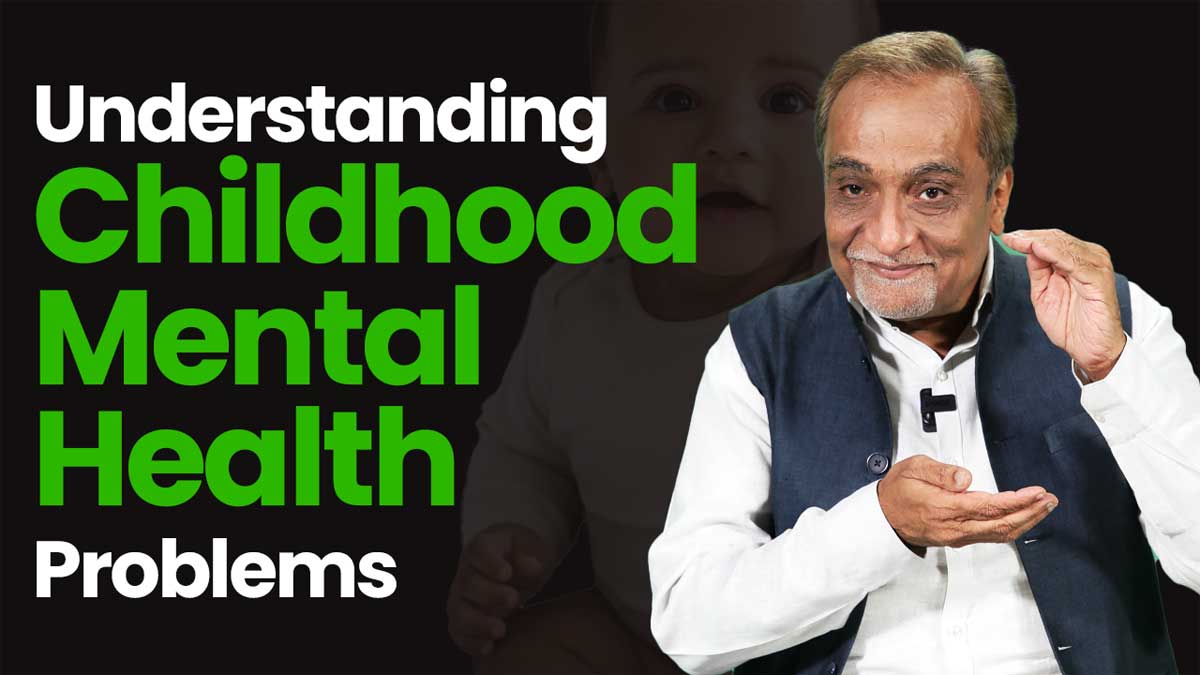
In our society, the hidden and often unidentified mental problems affecting children are a matter of concern. Contrary to popular belief, children do experience mental health issues, and it is imperative to address these concerns during their formative years to prevent potential problems later in life. This week in our 'A-Z of Mental Health' series, our expert Dr Nimesh Desai, Senior Consultant Psychiatrist and Former Director, IHBAS, Delhi, explains ‘Childhood Mental Health Problems’ and how to deal with it.
Table of Content:-
Common Mental Issues in Childhood

Dr Desai listed the common mental health issues in children as follows:
- Enuresis/Bedwetting
- Conduct Disorder
- School Refusal
- Depression/Suicidal Behavior
- Peer Group Impact
- Food Fads
- Body Image Disturbances
Causes of Children's Mental Health Issues

Dr Desai said that children's mental health problems can stem from various sources, including:
- Internal factors
- Family conflicts and issues
- Peer pressure
- School-related stress
Also Read: Mental Health A-Z: Expert Explains Anxiety And How To Deal With It
Childhood Mental Health Problems

Enuresis
Dr Desai said, "Most children develop bladder control by the age of five, but some may experience primary enuresis due to physical or biological factors. Bedwetting may persist beyond the age of 5-6, necessitating different treatment approaches, such as using waterproof blankets, implementing intensive toilet training, and medications, if needed."
Dr Desai added, "However, some children may develop control over time but relapse after some years, This can be due to family tensions or problems with school friends or teachers at school. In such cases, there is a need for psychological and social analysis for assessment and treatment."
School Refusal Problems
Dr Desai highlighted, "If your child has low academic performance, loss of interest in studies, or a reluctance to attend school, it is crucial to recognise this as a potential symptom of other mental problems."
Peer Group Impact
"The influence of both family and peer groups holds significant importance in a child's life", said Dr Desai. He added, "Peer group influence can have positive or negative consequences. Children can be deeply affected by issues like body shaming and teasing, which may lead to mental distress or depression."

Food Fads
Dr Desai highlighted, "Many children today struggle with eating disorders like anorexia or bulimia, often influenced by social and mental factors. Body shaming and peer pressure can contribute to cycles of anorexia or bulimia, along with daily life problems like obesity and increased screen time."
Conduct Disorder
Dr Desai said, "Children may exhibit changing behaviours, including tobacco, and alcohol use, and actions bordering on criminal behaviour. Instead of adopting a negative attitude, it is essential to understand the child's mental state and address the issue. In some cases, there may also be a need for acquiring professional help."
Also Read: Mental Health Matters: Impact Of Excessive Screen Time On Mental Health And How To Manage It
Treating Childhood Problems

Dr Desai listed measures that one should follow to address childhood mental health problems as follows:
- Refrain from judgement or criticism and respect each child's unique personality.
- Encourage communication with children and solve their issues.
- Rely on school counsellors to address school-related concerns.
- Seek assistance from medical professionals or psychiatrists when necessary.
- Don't hesitate to consult counsellors for mental health support.
According to the National Institute of Mental Health, if your child's behaviour lasts for several weeks or more, causes anxiety for your child or your family, or obstructs their ability to function at school, home, or with friends, you should think about getting them treatment.
Building Stronger Bonds with Children
Dr Desai emphasised, "Understanding and being friends with children can improve the parent-child relationship. Some children, especially those under the age of 5, may have difficulty expressing themselves, necessitating attention to indirect indicators."
Comprehensive 360-Degree Assessment
Dr Desai said to consider the following things to provide comprehensive support for children facing mental health challenges:
- Family and parental situations
- Peer group and friends
- School-related factors
[Disclaimer: The information in this article is shared by a registered healthcare professional and is for information purposes only. We advise you to reach out to an expert if you notice signs of mental illness in your children.]
Also watch this video
How we keep this article up to date:
We work with experts and keep a close eye on the latest in health and wellness. Whenever there is a new research or helpful information, we update our articles with accurate and useful advice.
Current Version
Oct 31, 2023 14:53 IST
Published By : Chanchal Sengar